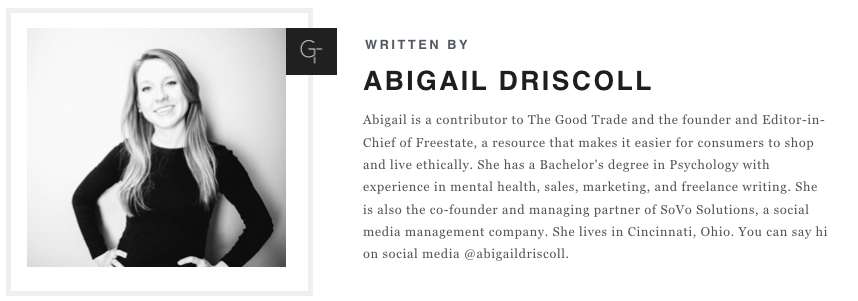
Conscious Living 101: Overcoming Cynicism About The Conscious Lifestyle
Overcoming Cynicism & Discouragement
The decision to change your lifestyle and start shopping and living more ethically is invigorating. You’re standing up for justice in the world. You’re letting go of convenience and entitlement for a broader cause. You feel a sense of purpose as you change your habits. You know your lifestyle will become healthier for yourself, your family, and the people making the products you buy. You feel powerful as you tell businesses they won’t have your support unless they clean up their supply chains. You find other like-minded people who are on the same mission, and you’re excited to find out that we’re all in this together.
But before long you discover: “Wow; this is harder than I thought.”
You have conversations with friends or family members, and the apathy on their faces doesn’t mirror the excitement on yours. You catch a couple companies lying about their ethical practices. And as you do more research, you realize there is a LOT more to living consciously than just buying ethically-made clothing. You see that although the conscious consumer movement is growing fast, it’s still a small movement in the grand scheme of things. You realize there are certain products you need for your family or home, that you just can’t buy ethically. So, your excitement dwindles and hopelessness begins to set in.
You think: “What is the point? Companies don’t care! The majority of consumers – even my own friends and family – don’t care, at least not enough to do anything about it.”
“It’s all about money and power; no one really wants to make the world better!”
“I can’t change this on my own so what’s the point?”
But the truth is that what you’re doing absolutely matters. In huge ways. You know it matters, or you wouldn’t have started in the first place. So when you start to have those thoughts and feelings, and when that hopelessness starts to creep in on you, try these four things:
1. Remember your ‘Why.’
It can be easy to get distracted, to let other voices get in your head and convince you that it either isn’t important or isn’t possible. When that begins to happen, remember why you started this journey in the first place. What first moved you so deeply that it led you to action? Was it a particular news story or documentary that first tipped you over the edge and made you want to change your ways? Was it a conversation? Go back and re-watch or re-read that story. Call that person you had that conversation with and have it all over again!
2. Set the right expectations and look at the big picture.
The conscious consumer movement is not going to explode overnight. Businesses are just NOT going to start acting and producing responsibly in a couple month’s time. It would be nice if it happened that way, right?! Set your mindset up for success by reminding yourself that change at this caliber takes time. Lots of time. Just because it’s not going to happen as quickly as we’d like doesn’t mean it’s not going to happen or isn’t already happening. Because it is! More and more consumers are starting to care about where their products come from. More companies are starting to answer the demand to increase transparency. There are more blogs, more boutiques, and more resources that help us all become more education and aware, giving us more choice and power. Step back; it may be happening slowly, but it is catching on, and change is real.
3. Choose Who You Surround Yourself With
This is an important one, not only when it comes to conscious living, but also just life in general. They say we become like the five people we spend most of our time with. So if you hang around a bunch of pessimists, you’re likely going to turn into a pessimist. If you spend your time with cynics, you’re most likely going to become a cynic. But on the flip side, if you surround yourself with people who are positive, motivated, hard working, and loving, then it’s likely you will take on those attributes as well. Take a minute to think about the five people who surround you the most, and therefore are the most influential in your life. Do they embody the type of person you want to become? Or is it perhaps time to distance yourself a little bit from some of them? Do you need to unfollow some people on social media? If so, that’s okay!
Along these same lines, we can also be very influenced by the media we consume. The news we read, the celebrities and podcasts we listen to, the shows we watch. It all affects who we are. It could be beneficial to take an evaluation of what type of media you’re consuming and what messages you’re absorbing. Does some of it need to be replaced? For example, I have a specific go-to podcast I listen to when I start feeling like I need a little more positivity in my life.
4. Practice mindfulness and awareness.
Each day, as often as you want, you have the ability to make a conscious decision about what kind of person you want to be. Increasing your awareness of what’s going on both outside of you as well as internally will help you recognize cynical or hopeless words and phrases from outsiders as well as in your own vocabulary. If you come across a cynical person (be it someone in your life, the author of an article you’re reading, etc.), you can take what they’re saying with a grain of salt. Listen and take their perspective into consideration (there may very well be some wisdom mixed in there!), while at the same time, recognize the lens they are speaking through.
If you recognize cynicism and hopelessness in your own thoughts or words, don’t run away from them. Instead, write them down, process them, talk about them with a trusted friend or partner. Then go back to your ‘why.’
Practicing mindfulness is a good way to start training and rewiring your brain until it becomes easier to get into and stay in a mindset that’s filled with gratitude and hope. Some of my favorite resources for learning how to meditate and incorporate mindfulness into my everyday life are mindbodygreen and Headspace.
What tactics do you use to fight cynicism and keep hope alive on your journey to conscious living?

